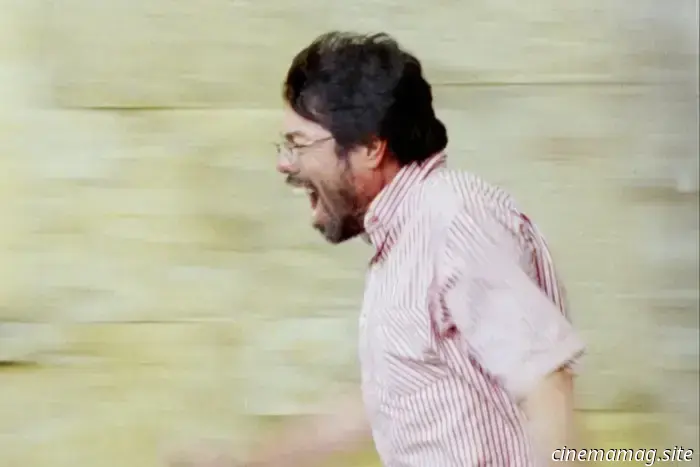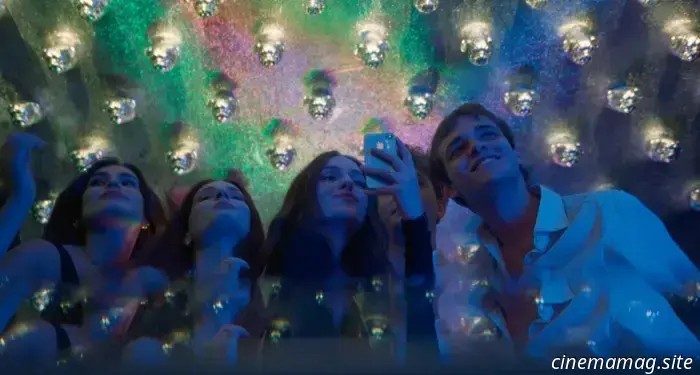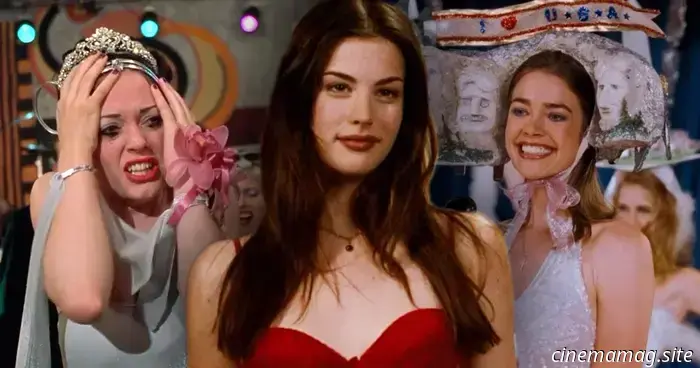
Cannes Review: A Poet Offers a Darkly Comic Look at Unsuccessful Creative Aspirations
Far removed from the sorrowful desires depicted in A Quiet Passion––and even more so from the everyday, soothing rhythms of Paterson––Simón Mesa Soto’s second feature set in Medellín discovers unexpected poetry in the rough, painful agony of shattered dreams and misunderstood, career-ending good intentions. A Poet’s Oscar Restrepo (Ubeimar Rios), while 2,000 miles away from the desperate, down-on-their-luck characters often portrayed by Sean Price Williams’ lens, would find acknowledgment in the shared Sisyphean struggle of failing at each opportunity life presents. This Un Certain Regard jury prize winner serves as a darkly humorous, cautionary character study about allowing long-buried creative aspirations to dictate every choice––one where Soto often finds compassion as his protagonist spirals downward.
Still holding onto the dreams of becoming a celebrated poet––or at least one whose work pays the bills––Restrepo has experienced what seems like a series of self-imposed trials and tribulations, enduring a perpetual mid-life crisis years after early acclaim for his published work. He lives with his mother (Margarita Soto), navigates a tumultuous relationship with his teenage daughter Daniela (Allison Correa), has no bank account (let alone spare change), and spends whatever little he manages to gather to feed his alcoholism. When he gets the chance to share his passion at the local poetry club, it feels as though his peers barely tolerate his eccentricities after years of enduring them. Following pressure from his sister to teach a philosophy class at a nearby school to regain control of his life, he discovers a glimmer of purpose.
Yurlady (Rebeca Andrade), one of his students, showcases both verbal and artistic talent, prompting Restrepo to mentor her. But does he genuinely believe in her? Is he looking to exploit her talent for personal inspiration? Does he selfishly aspire to be the savior who helps her escape her impoverished circumstances? Or is this new relationship merely a way to ease the pain of his lack of connection with his own daughter? Soto refreshingly avoids providing clear answers, steering away from black-and-white portrayals, and consistently keeping the audience guessing about Restrepo’s potentially questionable motivations. After one particularly disastrous evening, allegations of inappropriate behavior arise, yet Restrepo insists his intentions were noble; this leads to a complex conflict of wills involving Restrepo, Yurlady, her family, his poetry club, and the school administration.
In what is surprisingly his first acting role, Rios delivers an outstanding performance, displaying decades of regret etched in his weathered, bespectacled face. With a timid demeanor when not buoyed by the false confidence of alcohol, he clearly lacks the public-speaking skills or professional demeanor of his peers, despite dedicating his life to the art of poetry. There’s a defeated sadness in Rios’ eyes that renders his character, in Billy Corgan's words, a "rat in a cage." Shot on lively 16mm by Juan Sarmiento G., the camera remains focused on Restrepo, just as eager as the audience to unravel the mysteries of his desolate existence.
Rejecting what could have been a bleak, stifling character study, Soto embraces the humor in most circumstances, with swift cuts by editor Ricardo Saraiva highlighting Restrepo’s relentless desperation—from sleeping on the streets after drunken rants about legendary poets to crying in the car to rock ballads while revealing his inner turmoil. He’s the type of manipulative character who promises to help his daughter with college tuition in one moment, only to request five or ten dollars in the next, vowing to repay her.
This kind of unscrupulous character exploration may challenge the patience of viewers questioning the purpose of watching this sad figure descend deeper into his self-inflicted troubles, and some segments risk feeling repetitive. However, much like the Coens’ treatment of Larry Gopnik nearly fifteen years ago, this is another modern retelling of the Book of Job, revealing an absurdly comedic aspect to such struggles. Ultimately, after a humorously ironic conclusion to his devotion to Yurlady’s talent, Oscar Restrepo may be hapless, but he is not entirely hopeless.
A Poet had its premiere at the 2025 Cannes Film Festival.
Other articles
 Diciannove Trailer: Venice Selection Produced by Luca Guadagnino Arrives in the U.S. This July
Although he remains active in directing with this year's After the Hunt, following last year's double release of Challengers and Queer, Luca Guadagnino is also contributing his producing skills to several projects. In addition to Dea Kulumbegashvili's April and the Sundance premiere Atropia, he has also supported Giovanni Tortorici's directorial debut Diciannove, which
Diciannove Trailer: Venice Selection Produced by Luca Guadagnino Arrives in the U.S. This July
Although he remains active in directing with this year's After the Hunt, following last year's double release of Challengers and Queer, Luca Guadagnino is also contributing his producing skills to several projects. In addition to Dea Kulumbegashvili's April and the Sundance premiere Atropia, he has also supported Giovanni Tortorici's directorial debut Diciannove, which
 A trailer for NEDRA reveals the terrifying Soviet-era horrors lurking in Antarctica.
The Antarctic can be perilous if you're not adequately prepared, but in NEDRA, created by solo developer Davit Andreasyan, it's hazardous even when you are. NEDRA is a first-person survival horror game set to release on Steam on June 23rd, transporting players to the Soviet Red Star Antarctic research base, where they will encounter both otherworldly terrors and the harsh cold.
A trailer for NEDRA reveals the terrifying Soviet-era horrors lurking in Antarctica.
The Antarctic can be perilous if you're not adequately prepared, but in NEDRA, created by solo developer Davit Andreasyan, it's hazardous even when you are. NEDRA is a first-person survival horror game set to release on Steam on June 23rd, transporting players to the Soviet Red Star Antarctic research base, where they will encounter both otherworldly terrors and the harsh cold.
 7 Incredible 90s Teen Films You Might Have Overlooked
Casey Chong lists seven overlooked teen films from the 1990s. This decade featured a wide array of teen movies that spanned various genres, including comedies, horrors, and thrillers. While hits like Clueless, American Pie, and Scream achieved commercial success and became classics in their genres, many other teen films failed to gain attention and appreciation during their release. [...]
7 Incredible 90s Teen Films You Might Have Overlooked
Casey Chong lists seven overlooked teen films from the 1990s. This decade featured a wide array of teen movies that spanned various genres, including comedies, horrors, and thrillers. While hits like Clueless, American Pie, and Scream achieved commercial success and became classics in their genres, many other teen films failed to gain attention and appreciation during their release. [...]
 Heat Seeker: Exposed – Gun Honey Series #1 - Comic Book Preview
Titan Comics and Hard Case Crime's "Heat Seeker: Exposed" – part of the Gun Honey Series – is set to debut next week, and you can check out the official preview of the inaugural issue from this four-issue limited series below... As a tenacious investigative journalist prepares to unveil her illicit dealings, the master of deception, Dahlia Racers, must...
Heat Seeker: Exposed – Gun Honey Series #1 - Comic Book Preview
Titan Comics and Hard Case Crime's "Heat Seeker: Exposed" – part of the Gun Honey Series – is set to debut next week, and you can check out the official preview of the inaugural issue from this four-issue limited series below... As a tenacious investigative journalist prepares to unveil her illicit dealings, the master of deception, Dahlia Racers, must...
 12 Remarkable Young Actors Who Achieved Success Without Family Ties
Here are 12 young actors who achieved success on their own merit — through hard work and an abundance of talent. No nepotism involved.
12 Remarkable Young Actors Who Achieved Success Without Family Ties
Here are 12 young actors who achieved success on their own merit — through hard work and an abundance of talent. No nepotism involved.
 Ranking All 8 Mission: Impossible Films
Here are all eight Mission Impossible films ranked, including Mission Impossible — The Final Reckoning.
Ranking All 8 Mission: Impossible Films
Here are all eight Mission Impossible films ranked, including Mission Impossible — The Final Reckoning.
Cannes Review: A Poet Offers a Darkly Comic Look at Unsuccessful Creative Aspirations
In stark contrast to the sorrowful longings depicted in A Quiet Passion, and far from the soothing, everyday rhythms of Paterson, Simón Mesa Soto's second feature, set in Medellín, uncovers unexpected beauty in the harsh and painful anguish of shattered aspirations and misunderstood, career-ending good intentions. A Poet’s Oscar Restrepo (Ubeimar Rios) is situated a full 2,000 miles south of the despondent, struggling individuals commonly portrayed.
